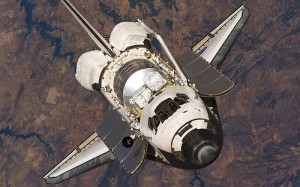I was in third grade when the Space Shuttle Columbia took its maiden flight into space. I remember getting up early to watch the launch on our big old oak cabinet TV that took minutes to warm up and showed images in color, but with a greenish tinge. I also remember watching the landing in my school cafeteria a couple days later.
Since then, the shuttle has been a peripheral part of my life. I never got to watch a launch live at the Cape, but as a sci-fi-obsessed kid growing up in the same state as most of the launches, I was always aware of the program.
Like every other American of my generation, I can remember precisely where I was and what was going on when I learned that Challenger had exploded. I was in ninth grade, lunch was all but over, and I was waiting in the hall outside my godawful Spanish class. Some kid came up and said the Challenger had exploded. How on earth did he find out, in that pre-internet, pre-smartphone age? I was pretty sure he was BS-ing us. I guess that’s my default response to tragic news: I replied with disbelief when I heard about the terrorist attacks on 9/11, and again when I heard about the Columbia’s disintegration.
In 2001 we moved from Miami to Central Florida. Barely a week after we closed on our house, while we were in the process of unloading a U-Haul, as a matter of fact, we heard a loud boom that we thought was one of the circuits in the house blowing. We spent several frantic hours searching for the source of the explosion, only to find out the next day what we’d heard: the sonic booms of reentry. Since then we’ve probably been treated to the sound about five dozen times, usually at inconvenient hours like shortly after dawn.
In 2002, NASA seemed to feel that enough time had passed since 1986 to restart its various citizen-in-space programs. I was nominated that year for the renewed Teacher in Space program. It was a hell of a longshot, but I never got the chance. The next February, I was awakened on a Saturday morning by a phone call from my father, telling me the Columbia had disintegrated.
Living in Central Florida, I got to watch a lot of the shuttles go up, though I never went out to the Cape. Even out where we lived you could see the shuttle climb, a little white wedge trailing smoke if it was daytime and fire if it was night. I took a whole classful of kids out to watch STS-107 go up, none of us knowing those astronauts would never make it back. I also watched STS-128 go up, the only night launch I ever watched. I actually saw this one from all the way out in Ocala–from a pool hall, if you can believe it–but you could still see it clearly. It trailed bright flames behind it, like the most amazing firework you ever saw, or like that star graphic from the “The More You Know” PSAs. I also watched the final mission go up, for the few seconds that it peeked out between the clouds.
For all that I may be over-romanticizing my memories of the shuttle program, a dash of reality is in order. The space shuttle program was a dead end, suited only to be a small part of a more ambitious space program that never materialized. I’ve seen a lot of talk about an era of space exploration ending. The shuttle performed no space exploration. It was a vehicle not capable of going beyond Low Earth Orbit. It was about as much exploration as a seven-year-old walking to the end of the block over and over again, sometimes with binoculars.
An era of space exploration ended, yes, but it ended long before this final flight. I’m sad to see the apparent direction we’re going–depending on other countries to get our astronauts into space, or back to disposable vehicles. For all the grandiose talk about a lunar base or about a manned trip to Mars, we don’t appear to be a society that can pull it off.
Over the years, I’ve heard a lot of people grouse at the money spent on the space program. This always struck me as an ignorant position. The space program launched tons of spin-off technology that made life better on Earth–everything from better solar cells to sports bras, of all things. Beyond that–and this is the point where my opinion gets dismissed as that of someone who’s read too much science fiction–I believe it’s necessary to our survival as a species for us to work toward one day being able to permanently live off Earth.
So I’m sad to see the shuttle program go. Not because it was a ringing success–it wasn’t. But because it was the best we had.


 Subscribe via RSS
Subscribe via RSS